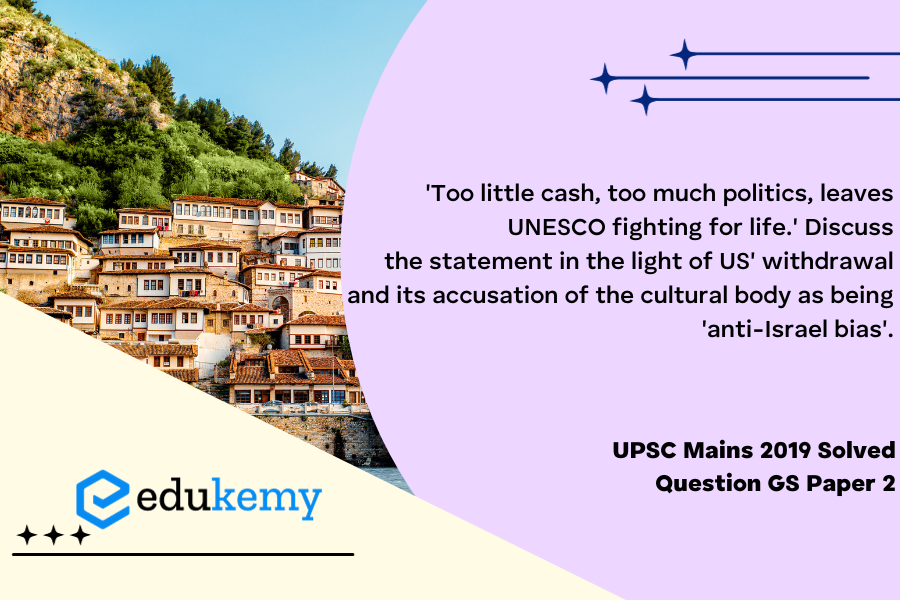The statement “Too little cash, too much politics, leaves UNESCO fighting for life” encapsulates the tumultuous predicament faced by the United Nations Educational, Scientific and Cultural Organization (UNESCO), particularly in the aftermath of the United States’ withdrawal. This withdrawal, prompted by allegations of an “anti-Israel bias,” has plunged UNESCO into a financial crisis and exposed the organization to the harsh realities of global power dynamics. The significance of the financial strain is evident as UNESCO struggles to sustain its core mission of promoting international collaboration in education, science, and culture. The accusation of bias has not only strained diplomatic relations but has also highlighted the intricate interplay between geopolitics and the survival of international institutions. The controversy surrounding UNESCO underscores the delicate balance required for such organizations to navigate political sensitivities while safeguarding their fundamental principles. As UNESCO grapples with these challenges, the global community must reflect on the broader implications of diminishing support and the erosion of multilateralism, recognizing the importance of fostering an environment where cultural, scientific, and educational cooperation can thrive independently of political discord.
Tag: Important International institutions.
Contents
Decoding the Question:
- In the Introduction, try to briefly write about UNESCO.
- In Body,
- Discuss the recent issue of the US and Israel leaving UNESCO.
- Also, write the impact of the withdrawal on UNESCO.
- In Conclusion, try to suggest a way forward.
Answer:
UNESCO was created in 1945 with the firm belief that, forged by two world wars in less than a generation, political and economic alliances were not enough to build world peace. In this sense, peace must be established based on humanity and our moral and intellectual solidarity with one another. It also focuses on issues related to Human Rights, Education of Migrants and Refugees, Peace, Science and Technology for Development, etc.
Too Little Cash and Too Much Politics:
- The United States and Israel were members but left in 2018, asserting that the organization had an anti-Israel bias.
- At the heart of its problems is a financing crisis since 2011, when UNESCO voted to admit Palestine as a full member state and Washington responded by halting payment of its annual $80 million in dues.
- Without U.S. money, UNESCO, which employs around 2,000 people worldwide, has been forced to cut programs, freeze hiring, and fill gaps with voluntary contributions. Its 2017 budget was about $326 million, almost half its 2012 budget.
- Washington and Tel Aviv had declared their intention to leave the United Nations Educational, Scientific, and Cultural Organization as early as 2017.
- UNESCO was founded after World War II; it was a club of Western states, its cultural and educational work was necessary for establishing a post-fascist, liberal order in Nazi-destroyed Europe.
- Russia and Ukraine have been at odds over Crimea, with Kyiv accusing Moscow of trying to legitimize its annexation of the territory through UNESCO.

Impact of the Withdrawal and UNESCO Fight for Life:
- The U.S. has played an important role in many Intergovernmental Oceanographic Commission (IOC) programs, which are critical to the ocean health and well-being of coastal communities.
- Without funding, UNESCO, which employs around 2,000 people worldwide, has been forced to cut programs, freeze hiring, and fill gaps with voluntary contributions. Its 2017 budget was about $326 million, which is almost half its 2012 budget.
- The number of permanent science positions has also decreased due to less funding.
- The organization’s basic science efforts were severely impacted, and it is no longer directly involved in earth observation and remote sensing projects, with few exceptions.
- It is a serious problem at the time of rapid natural changes underway due to climate change.
- It no longer spends a regular budget on renewable energy activities, and its engineering activities have been strongly curtailed.
- It has also failed to persuade member states to pay their dues and stop politicizing UNESCO’s work.
The fact is that UNESCO was all about solidarity and creating a climate for peace between countries, but nations now use their dues/funds to influence programs. The preservation of shared human heritage needs a concerted effort involving all countries, for this, nations should sacrifice a zero-sum game of politics. The nations are using the platform of UNESCO to put forward their domestic politics, which is impacting its multilateral nature. Its members should come together for grassroots reforms and efforts to depoliticize the institution.
In case you still have your doubts, contact us on 9811333901.
For UPSC Prelims Resources, Click here
For Daily Updates and Study Material:
Join our Telegram Channel – Edukemy for IAS
- 1. Learn through Videos – here
- 2. Be Exam Ready by Practicing Daily MCQs – here
- 3. Daily Newsletter – Get all your Current Affairs Covered – here
- 4. Mains Answer Writing Practice – here


